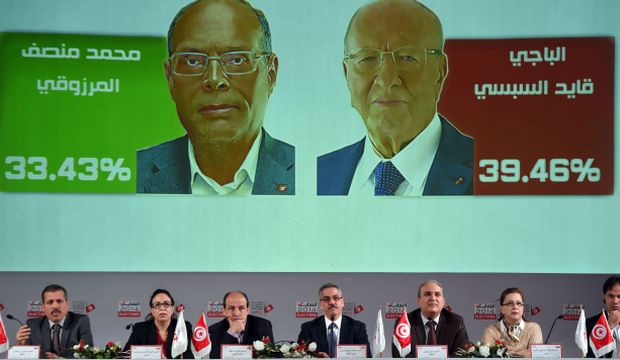
Members of the Tunisian ISIE elections body hold a press conference to announce the final results of the first round of the presidential election on December 8, 2014. (AFP PHOTO / FETHI BELAID)
The vote for Tunisia’s first directly elected president marks the final step in the North African state’s transition to full democracy following the 2011 revolution.
EL-Sebsi narrowly beat Marzouki in the first round of the presidential election—the first since Tunisia’s 2011 uprising that toppled autocrat Zine El-Abidine Ben Ali and inspire the Arab Spring revolts. But the two front runners failed to win enough votes to avoid meeting again in the December run-off.
“The run-off will be held on December 21, and the electoral campaign will start December 9 through December 19,” Chafik Sarsar, the head of Tunisia’s electoral commission told a press conference.
Islamist party Ennahda, which won the first parliamentary election after the revolution, did not field a candidate for the presidential vote. But its supporters may be key in deciding who wins the run-off.
A former Ben Ali-era official, EL-Sebsi, 87, has cast himself as an experienced statesman with the skills to manage Tunisia’s economy and security, dismissing critics who worry about the return of old regime officials.
Marzouki, a rights activist, says the return of officials from Ben Ali’s one-party rule would erode the revolution that ended Ben Ali’s regime.
But Marzouki’s critics tie him to the Islamist-led government that took office in 2011 and that critics blame for mishandling the economy and security. It was forced to hand over to a technocratic government in January following a crisis over the killing of two secular leaders by Islamist militants.
Both candidates will now seek support from the range of Islamist, liberal and left-wing parties who fielded candidates. Key will be who wins votes from supporters of Ennahda and the left-leaning Popular Front, both well-organised movements.
After Islamist and secular rivals overcame the crisis last year and approved a new constitution, Tunisia has been held up as a model of democratic change and compromise in a region where neighbors like Libya are caught up in turmoil.
